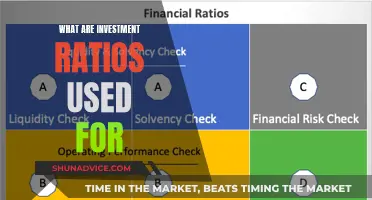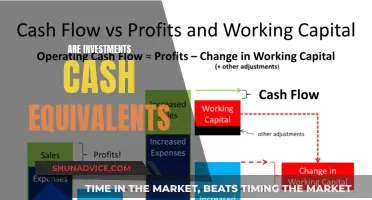
Cash investments are short-term investments, usually for 90 days or fewer, that provide returns in the form of interest payments. They are highly liquid, low-risk investments that can be easily converted into cash. Examples of cash investments include money market accounts, certificates of deposit (CDs), savings accounts, treasury bills, and commercial papers. Money market accounts and CDs are considered some of the safest cash investments as they are insured by the Federal Deposit Insurance Corporation (FDIC) in the US. Cash investments are suitable for investors seeking capital preservation and low-risk investment options.
| Characteristics | Values |
|---|---|
| Investment type | Short-term |
| Risk level | Very low |
| Returns | Low |
| Liquidity | High |
| Maturity period | 3 months or less |
| Interest payments | Variable, fixed, or compound |
| Accessibility | Easily accessible |
| Investment options | Money market accounts, certificates of deposit, savings accounts, US Treasury bills, commercial papers, term deposits, cash management accounts, money market funds, etc. |
What You'll Learn

Money market accounts
MMAs usually offer a higher interest rate than traditional savings accounts, although this has not always been the case. Interest on money market accounts is compounded daily and paid monthly. There are no withdrawal penalties, and money is accessible when you need it.
MMAs are available from traditional banks and credit unions, as well as online banks, which may offer higher interest rates due to lower overheads. They are a good option for those who want to grow their money more quickly than in a traditional savings account but without the uncertainty of an investment account.
There are some restrictions on money market accounts. Firstly, there are federal transaction limits, with a traditional limit of six transfers or withdrawals per month. Secondly, some banks require a high minimum balance to open an account or to avoid fees.
Overall, money market accounts are a solid savings choice, offering a good interest rate in a low-risk, flexible account.
Maximizing Cash Balance Plans: Strategies for Savvy Investors
You may want to see also

Certificates of deposit
CDs are available at banks, credit unions, and brokerages, and they generally pay higher interest rates than savings and money market accounts. The interest rates on CDs are usually fixed, although there are variable-rate options that can earn a higher return if rates rise. The longer the term, the higher the interest rate tends to be. CDs with shorter-term maturities can sometimes offer higher yields if interest rates are higher when the CD is issued but expected to decrease during the term.
CDs are a safer and more conservative investment option than stocks and bonds, but they offer lower growth potential. They are suitable for those seeking a secure investment vehicle to preserve their capital. CDs are often used by investors who need a temporary place to keep their cash while exploring other investment opportunities.
When purchasing a CD, there is usually a minimum deposit requirement, which can be $1,000 or more. Additionally, to obtain a higher interest rate for the same term, a deposit of at least $100,000 may be necessary. It is important to note that withdrawing money from a CD before its maturity date may result in forfeiting some or all of the expected interest.
The Power of Investing: Timing Cash Flows is Irrelevant
You may want to see also

Savings accounts
While the interest rates on savings accounts are usually low, they are often higher than those of checking accounts, and some savings accounts may even offer overdraft protection. Additionally, savings accounts are FDIC-insured for up to $250,000 per depositor, per bank, giving you peace of mind that your money is safe.
However, due to their low-interest rates, savings accounts may not be the best option if you're looking for significant returns or trying to outpace inflation. In such cases, investing in stocks, bonds, or other investment vehicles may be more suitable. Nonetheless, savings accounts are an excellent choice for those seeking a safe and accessible place to store their money while earning a small return.
When choosing a savings account, it's important to consider the interest rate, fees, minimum balance requirements, and other features offered by different financial institutions to ensure you find one that aligns with your financial goals.
Depreciation's Impact on Cash Flow: Investing Activities
You may want to see also

Treasury bills
T-bills are issued at a discount from the par value, also known as the face value. For example, if the face amount is $1,000, they would sell for less than that but mature to the full $1,000. The interest income from T-bills is exempt from state and local income taxes but is subject to federal income tax.
T-bills are a good option for investors looking for a safe and secure investment with a short-term maturity. They are typically held until the maturity date or cashed before maturity. T-bills can be purchased directly from the US Treasury through TreasuryDirect or from a brokerage firm, which may charge a small fee.
T-bill prices tend to rise when the US Federal Reserve is engaged in an expansionary monetary policy and fall when the Fed sells its debt securities. The maturities available for T-bills are four, eight, 13, 17, 26, and 52 weeks, or one, six, and 12 months.
T-bills are considered low-risk, short-term investments when held to maturity. The US government guarantees them, so there is virtually no risk of default. However, their low-risk nature also means they generally provide lower yields than other investments.
Cash Reserves: Smart Investment Strategy or Missed Opportunities?
You may want to see also

Commercial papers
Commercial paper is a short-term, unsecured debt instrument issued by corporations to finance short-term liabilities. It is typically used to finance short-term expenses such as payroll, accounts payable, and inventories. Commercial paper is usually issued at a discount and matures at its face value, with terms ranging from one to 270 days and an average maturity of around 30 days. The minimum denomination for commercial paper is $100,000, and it pays a fixed rate of interest that fluctuates with the market.
Commercial paper was first introduced during colonial times as a bill of exchange. It became more modern in the 1920s when New York merchants began selling their short-term obligations to dealers to access capital for near-term obligations. These dealers, acting as middlemen, purchased the paper (also known as promissory notes) at a discount from their par value and then sold it to banks and other investors. The merchants would then repay the investors an amount equal to the par value of the note.
Commercial paper is not backed by any collateral, making it an unsecured debt. It differs from asset-backed commercial paper (ABCP), which is a class of debt instruments backed by assets selected by the issuer. Commercial paper is only issued by firms with high ratings from credit rating agencies, as they can easily find buyers without offering a substantial discount.
Commercial paper is issued by large institutions in denominations of $100,000 or more, and it is primarily bought by institutional investors such as money market funds, corporate treasurers, banks, and other financial institutions. Wealthy individuals may also invest in commercial paper through private placements.
Commercial paper offers several advantages, including speed and flexibility in raising funds, lower costs compared to other types of short-term borrowing, and the potential for credit enhancement. However, there are also risks associated with commercial paper, including credit risk, interest rate risk, liquidity risk, and regulatory risk.
Owner's Investment Cash: Operating Activity?
You may want to see also
Frequently asked questions
Examples of cash investments include savings bank deposits, certificates of deposits, treasury bills, commercial papers, and term deposits with maturities up to 90 days.
Cash investments are considered safe investments with a low level of risk. They are highly liquid short-term assets that can be converted into cash easily. They also provide stable returns by way of interest on a periodic basis.
Cash investments have a lower rate of return compared to other investment options. They also carry an interest rate risk, which means that the value of the investment will fall as the interest rate rises.







